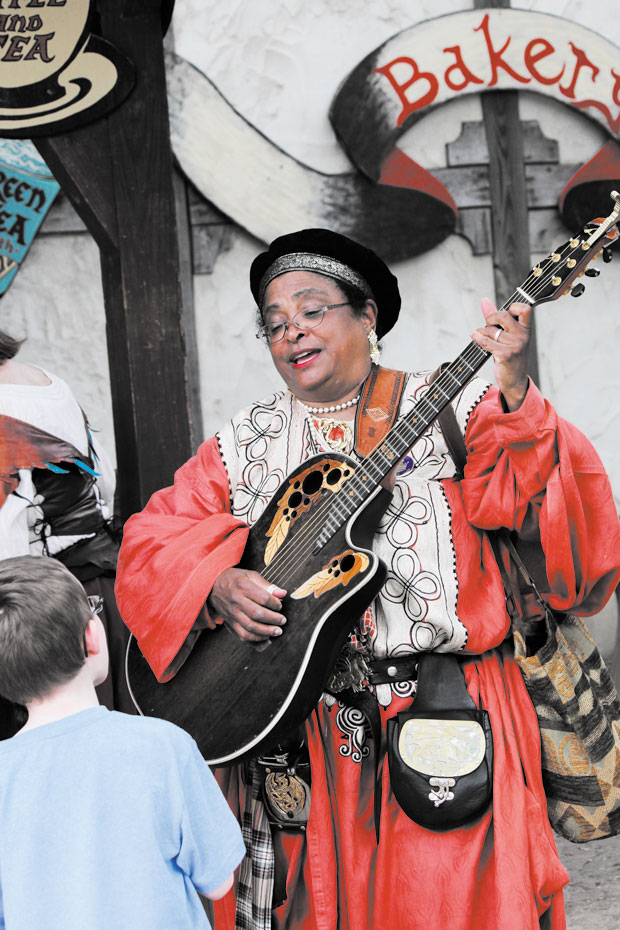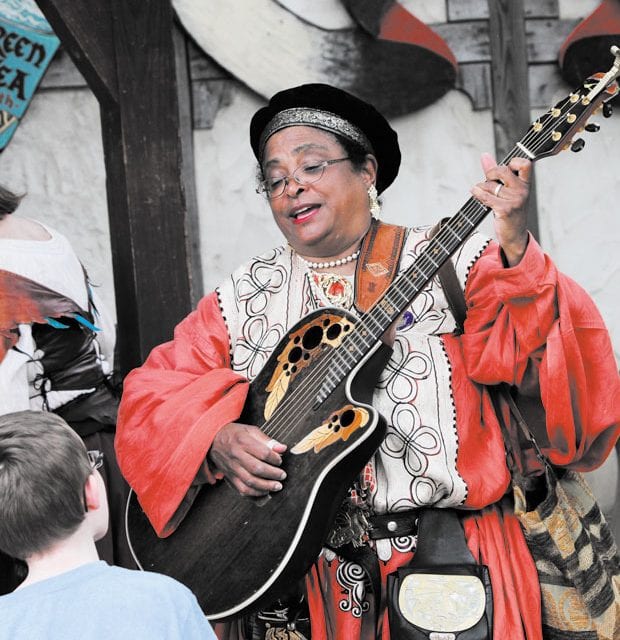Leza Mesiah, singing on the frontlines of history

JAMES RUSSELL | Staff Writer
Editor’s note: Profiles in Pride is a series of articles featuring community leaders that will highlight each of the letters in our LGBT community. A new profile will be published each Friday in June, and the series starts here with the “L.”
As Leza Mesiah puts it, she was there.
The Buffalo, N.Y., native and Dallas transplant has been a witness to the civil rights movement, the women’s liberation movement and the fight for LGBT recognition.
Instead of being on the front lines herself, as her parents were in their work with the civil rights movement and their long-time involvement with the Buffalo chapter of the
National Association for the Advancement of Colored People, she’s preferred to help those on the front lines.
Growing up, Mesiah remembers all too well the threats her family faced because of their activism. “I like to be around people who make a difference in the world. I just didn’t want the hateful phone calls,” she said.
Everyone has a role in activism, Mesiah said in a winding conversation with the Dallas Voice. Hers was to support and help “her controversial friends,” she said with delight. Friends like Steve Wilkins, Vivian Armstrong and Louise Young were on the front lines.
Mesiah said she chose to express her political commitment through financial support to organizations and events, often donating anonymously. But fear wasn’t what kept her from a more visible role; she also had a job in media.
One of the founders of what is now the National Public Radio show All Things Considered, Mesiah came to Dallas after a job offer from WBAP and KSCS “before it was hate radio,” she said. Given her public role, that concluded two years ago when she retired from WRR, she had to stay relatively objective — or at least fair.
For that same reason, she’s never been publicly out. But she also never lied if asked. (Indeed, she married her partner in 2013 in San Francisco.)
“In order to change hearts, you have to come out,” Mesiah acknowledged. “But I know some people can’t, even though we’re in a different time. My partner and I come from a different time. My generation was fearful because of the repercussions.”
But one thing she was never scared of was performing — singing in particular.
The self-described “history geek” is a regular fixture at Scarborough Renaissance Festival where she performs as The Moor of Dundee. She has already recorded two albums, and is working on a third.
Among all the white noblemen and decked-out warrior princesses at the faire, Mesiah stands out. The Moor of Dundee, she explains, is “the generic African noble who fell in love with a Scot.”
Being a character at the faire, to her, is akin to being a Civil War re-enactor. Both share a love of history, especially the type you didn’t learn in school.
At the Renaissance faire, people aren’t just dressed up for the fun of it. It’s actually a lot more personal, Mesiah said. “We go beyond what we were told happened. We’re re-enacting it the way history was but what it also should’ve been. There’s a spirtualness to it,” she said.
Mesiah continued, “Studying and exploring it on your own teaches you a lot more than any course. History teaches you about yourself. In order to feel better about yourself, you have to know your history.”
That’s especially what attracted to Mesiah Renaissance history. She wanted to know her role as a black woman in a pivotal time in Western history. “It was a time of great learning,” she said. “The long lulls where nothing happened resulted later in great innovation as well. So much change was happening.”
But amidst that change, history courses often overlook the contributions made by Africans. Her role as Moor of Dundee is to insert that history into the public domain.
The Moor of Dundee is not just a rebellious noble, she said, but also an activist and musician. Don’t confuse her with a Bob Dylan political crooner; her activism is more one-on-one.
The faire may bring good-natured egalitarians together despite the clearly indisputable segregation of the era. Even in the modern day, however, Mesiah still encounters the crusty white man; the type looking to take a jab, if only out of ignorance because of her race, and ask her condescendingly to sing. She’ll belt out the Irish musical staple “Danny Boy.”
“Nothing makes an old man cry like ‘Danny Boy’,” she said, briefly humming the tragic song before laughing. “They’ll later come up and apologize. When you understand other cultures [even if someone is ignorant] you never meet a stranger.
Mesiah said finds power in music; it changes hearts and minds.
It was a power that helped her through the AIDS crisis when she lost her best gay male friends, including many of the forefathers of Dallas activism.
Were they still alive, she would’ve probably raised children with them. “It was a loss for families.”
She also lost her partner Susan Eastman, to cervical cancer. But through song, she stayed strong. Music, too, helped then.
“I was trying to change hearts and minds during that time. I was trying to change the public perception [of AIDS] through song,” Mesiah, an original member of the
Women’s Chorus of Dallas, said. In partnership with the Turtle Creek Chorale, they sang a harrowing set, When We No Longer Touch: A Cycle of Songs for Survival, to honor those who died from AIDS. One song in particular, “I Shall Miss Loving You,” still rings in her ears.
In reconsidering her role in creating a Dallas LGBT scene, Mesiah re-thinks her earlier statement. “I didn’t realize I might have been on the front of the frontline after all.
“The labor movement had a song. The civil rights movement had a song. The women’s liberation did too. The gay rights movement does too.”
She can’t remember who said it, but a quote suddenly came to mind: “In every revolution, there’s always music.”
This article appeared in the Dallas Voice print edition June 5, 2015.

